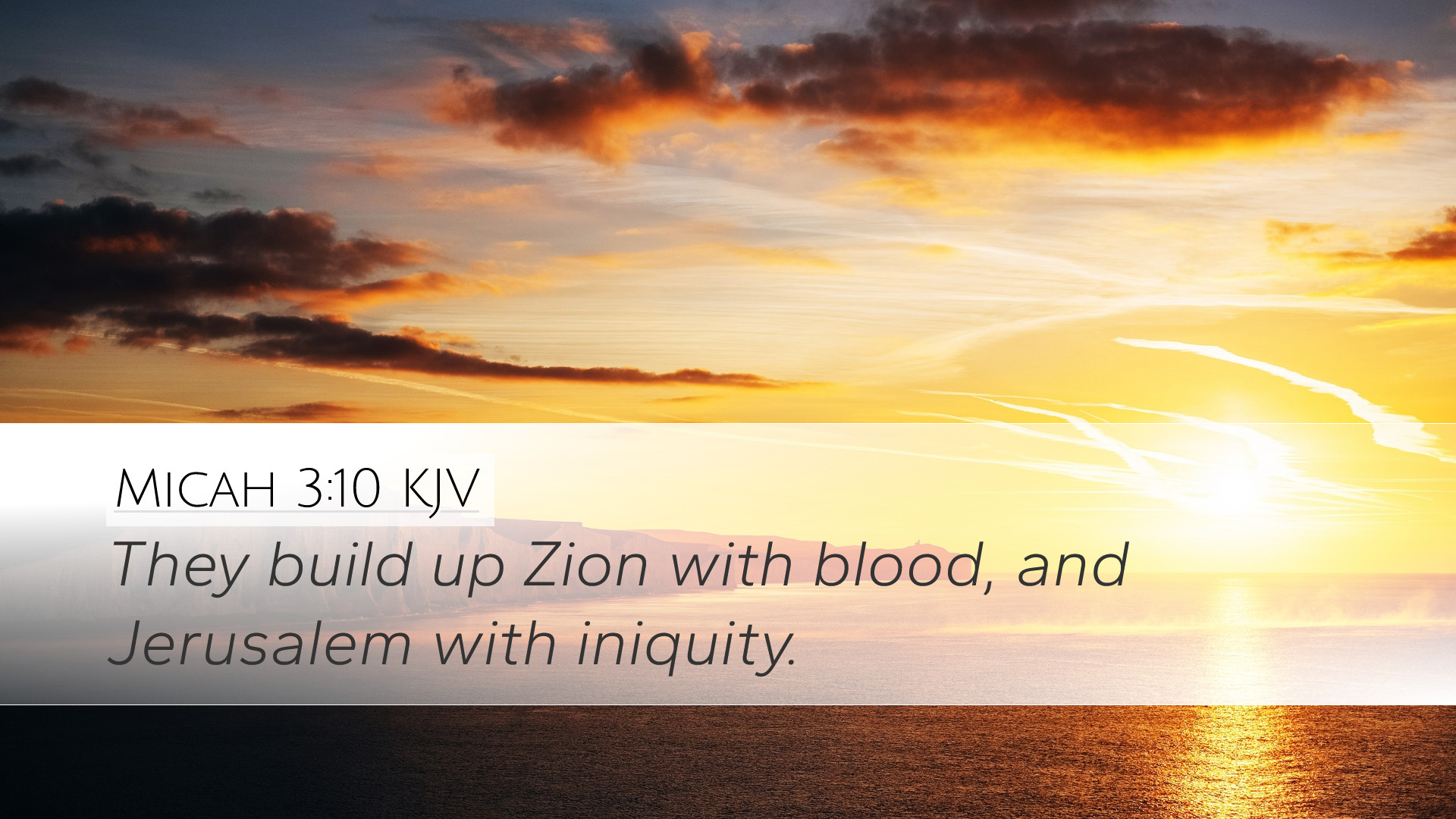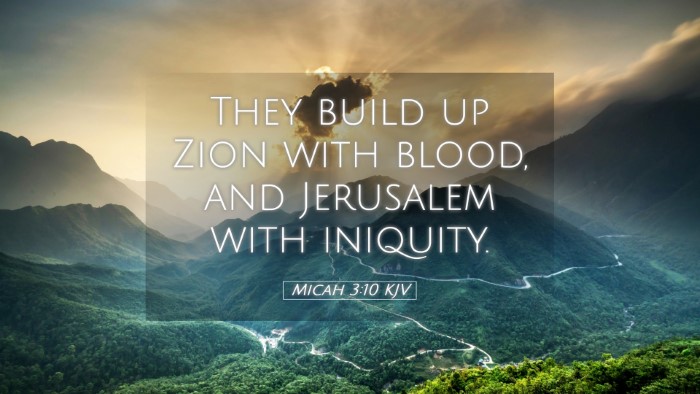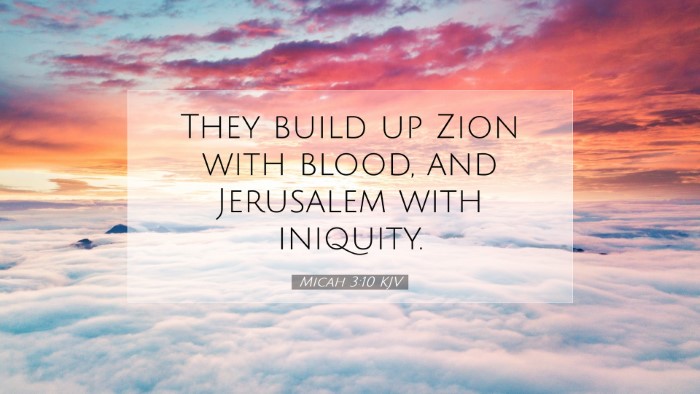Old Testament
Genesis Exodus Leviticus Numbers Deuteronomy Joshua Judges Ruth 1 Samuel 2 Samuel 1 Kings 2 Kings 1 Chronicles 2 Chronicles Ezra Nehemiah Esther Job Psalms Proverbs Ecclesiastes Song of Solomon Isaiah Jeremiah Lamentations Ezekiel Daniel Hosea Joel Amos Obadiah Jonah Micah Nahum Habakkuk Zephaniah Haggai Zechariah MalachiMicah 3:10
Micah 3:10 KJV
They build up Zion with blood, and Jerusalem with iniquity.
Micah 3:10 Bible Commentary
Commentary on Micah 3:10
Micah 3:10 (KJV): "They build up Zion with blood, and Jerusalem with iniquity."
Understanding the Context
Micah, a prophet from Moresheth, prophesied during a turbulent time in Israel's history when the northern kingdom was facing impending judgment from Assyria. His messages focus on the corruption, social injustice, and idolatry prevalent in Israel and Judah during the late 8th century B.C. This particular verse, Micah 3:10, serves as a pointed critique of the leaders who exploit their people.
Exegesis of Micah 3:10
The phrase "They build up Zion with blood" signifies the violent and unjust means by which the ruling class seeks to establish and fortify their own positions of power. Matthew Henry comments that the leaders are engaged in a form of construction that is morally and spiritually flawed, laying a foundation built not on righteousness but on oppression. The term "Jerusalem with iniquity" suggests that the leaders are corrupting the very heart of the nation with their sinful behaviors.
- Social Justice: The leaders are criticized for neglecting the welfare of the poor and vulnerable. This reflects a broader theme in Micah where social justice is paramount.
- Civic Responsibility: The implication is that the societal structure should be focused on promoting justice and righteousness rather than exploitation.
- Theological Implications: By tying the prosperity of Zion and Jerusalem to iniquity, Micah asserts that God will not bless a nation built on bloodshed and sin.
Insights from Public Domain Commentaries
Albert Barnes notes that the leaders’ actions contrast starkly with the divine ideal for governance as established in the law. They are building a city (Zion) that should encapsulate holiness, yet, through their actions, they invite divine retribution. Barnes emphasizes that this verse reflects a profound disconnection from God’s will, where the city represents not only a physical location but also the spiritual state of the people.
Adam Clarke delves into the implications of this verse on the ethical responsibilities of leaders. He articulates that the verse serves as a warning against those who prioritize personal gain over the moral and spiritual welfare of the community. Clarke's view reinforces that true leadership, particularly in a biblical context, should be one of servanthood and stewardship, not one that builds through violence and sin.
Theological Reflection
This verse raises critical theological questions about the nature of God’s justice and the implications of collective sin. When societal structures are upheld through injustice, the text communicates that such edifices are doomed to collapse under divine judgment. Pastors and theologians must wrestle with how this verse informs contemporary understandings of justice within the church and society.
- God's Justice: God's judgment against unjust leaders serves as a reminder that divine justice ultimately prevails.
- Human Responsibility: Believers today are called to be agents of change in society, advocating for those who are oppressed and holding leaders accountable to righteous standards.
- Building with Integrity: The metaphor of building suggests that genuine leadership champions integrity and compassion, both of which are aligned with God's character.
Practical Application
For pastors and church leaders, Micah 3:10 serves as a powerful reminder to evaluate how they lead and disciple others. The challenge lies in striving to establish communities that reflect God's love, justice, and mercy.
- Prayer for Leaders: Regular prayer for local leaders and church authorities can foster a culture of accountability and integrity.
- Advocacy: Churches can engage in social justice issues, empowering congregants to advocate for the marginalized and lead with compassion like Christ.
- Teaching Righteousness: Educating congregations on the biblical mandates for justice and righteousness is essential in developing morally sound individuals who can cover these principles in their communities.
Conclusion
In summary, Micah 3:10 offers a piercing insight into the consequences of corrupt leadership and the societal implications of iniquity. By synthesizing insights from various public domain commentaries, we see a vibrant portrait of what it means to genuinely build up a community in faith. In light of this text, churches can renew their commitment to justice, compassion, and integrity, reflecting God’s kingdom values in a broken world.


